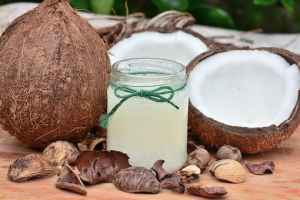
SO GOOD FOR SO MUCH!
Numerous alternative doctors have listed multiple health benefits from using coconut oil:
Understanding Coconut Oil by Dr Stephen Sinatra.
20 Benefits from Coconut Oil by Dr Josh Axe.
5 Reason to Use Coconut Oil by Newsmax Health including Dr Blaylock.
These benefits variously include heart health, weight loss, decrease in candida and other yeast problems, decreased inflammation, alzheimer’s improvement, brain health, skin and hair improvements, and lowered cholesterol levels, among others.
Unlike other fats, the distinct medium-chain triglyceride saturated fat makeup of coconut oil is processed quickly through the liver, releasing energy for the brain and body, and is then not stored as fat. Coconut oil contains lauric acid and capric and caprylic acids, influential in reducing infections and inflammations. This plant oil is also essentially toxin free.
General Characteristics: Virgin vs Refined Coconut Oil:
Virgin – coconut flavor and aroma, sometimes pronounced. — Refined – neutral flavor and aroma.
Virgin smoke point is 350F. — Refined smoke point is 400F.
Both: Per 1 Tbsp: 120 calories, 0 Carbs, 0 fiber, 0 sugar, 0 gluten.
Both are interchangeable in most recipes.
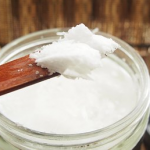 From the Nutiva site , advice on buying Virgin Organic Coconut Oil:
From the Nutiva site , advice on buying Virgin Organic Coconut Oil:
“Virgin Coconut Oil is cold-pressed, made without hexane, and never deodorized or bleached…make sure it’s certified organic and verified Non-GMO.”
And advice on buying Refined Organic Coconut Oil:
 “Organic refined coconut oil naturally has a yellowish color to it… Only chemically bleached and refined coconut oil is pure white. Our Refined Coconut Oil goes through an organic steam refining process and some of the yellow color naturally remains in the product as the dried coconut is not treated with sulfites or other bleaching agents.
“Organic refined coconut oil naturally has a yellowish color to it… Only chemically bleached and refined coconut oil is pure white. Our Refined Coconut Oil goes through an organic steam refining process and some of the yellow color naturally remains in the product as the dried coconut is not treated with sulfites or other bleaching agents.
And additionally, from the site Extra Crispy:
Virgin, Organic Coconut Oil: “If you’re using unrefined or virgin coconut oil, you’re using coconut oil extracted from the fresh meat of the coconut…the dry processing, or expeller-pressed, method of making coconut oil is more common.
“Unrefined coconut oil, then, is this pure oil that’s the product of… relatively low-heat extraction processes. As a result,… it’s got a bit of a coconut flavor. So if you’re looking for coconut oil that’s more neutral in taste, you should go for refined coconut oil. [Emphasis added.]
“Refined, Organic Coconut Oil: Some brands use a steam refining process with no chemicals… When you’re making refined coconut oil, you’re using copra, which is that same white coconut meat but dried, rather than fresh.”
The above is yellowish in color and this pure product is the one you want. Contrast that with —
“RBD coconut oil… stands for ‘Refined, Bleached, and Deodorized‘. In the RBD process, the oil is deodorized under high heat, and afterward it is filtered through clays that serve to bleach the oil and remove any impurities. Finally, sodium hydroxide is used to remove any free fatty acids in the interest of prolonging the oil’s shelf life.”
[Refined, bleached, and deodorized… sounds like something you’d do in the laundry room……]
I use organic virgin coconut oil, unrefined, and graced with a beautiful coconut scent which I am particularly fond of. It is great for cooking, and as a hand cream and lip cream by itself, or mixed with herbs or other oils to soften skin and heal scratches. Good for pet boo-boos too.
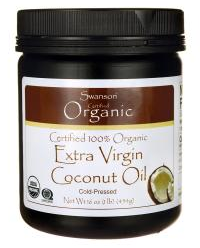 The alternative medical guys recommend between one teaspoon and one tablespoon three times a day. Organic coconut oil – unrefined or refined – is solid at room temperatures.
The alternative medical guys recommend between one teaspoon and one tablespoon three times a day. Organic coconut oil – unrefined or refined – is solid at room temperatures. 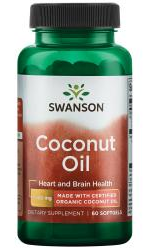 Coconut oil also comes in 1,000 mg (one gram) capsules.
Coconut oil also comes in 1,000 mg (one gram) capsules.
And if you want a delicious healthy fairly low carb side treat for friends, fix a plate of pecan nut-thin crackers spread generously with organic coconut oil, topped with fresh minced garlic, and a sprinkle of Himalayan crystal salt. Put in a cold oven at 350F for maybe 4 or 5 minutes. The coconut oil will be melted and the garlic will be just warmed. Tasty. Tasty. Tasty.
END NOTE:
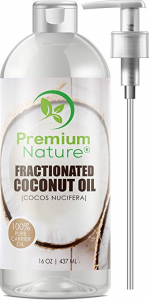 So what about Fractionated Coconut Oil…? From the site Hebe Botanicals this quote: “So is FCO natural? No, not in the sense that it is made by a complex industrial process that chemically breaks coconut oil down and then reconstitutes some of the fatty acids into a new manufactured triglyceride (oil)… In fact caprylic/capric triglycerides make up far less than 1% of natural coconut oil. This low percentage explains why we don’t just extract caprylic/capric triglycerides straight from coconut oil. That is, you can’t get FCO through fractional crystallization by slowly cooling coconut oil (though there are websites that try to explain it this way). FCO is a synthesized product…”
So what about Fractionated Coconut Oil…? From the site Hebe Botanicals this quote: “So is FCO natural? No, not in the sense that it is made by a complex industrial process that chemically breaks coconut oil down and then reconstitutes some of the fatty acids into a new manufactured triglyceride (oil)… In fact caprylic/capric triglycerides make up far less than 1% of natural coconut oil. This low percentage explains why we don’t just extract caprylic/capric triglycerides straight from coconut oil. That is, you can’t get FCO through fractional crystallization by slowly cooling coconut oil (though there are websites that try to explain it this way). FCO is a synthesized product…”
This doesn’t mean it doesn’t have uses. It is quite popular as an external-use only carrier oil for essential oils. But it is not “natural”. It is very processed.
END NOTE 2: The products pictured above are not recommended nor are they paid-for-advertisements. They are illustrations only.
END NOTE 3: David Lewis of KitchenAmbition.com contacted us in late 2020 wondering if his article “Does Coconut Oil Go bad?” would fit well in this article. My own experience with coconut oil is that if kept in the dark and fairly cool it lasts one heck of a long time. That said, however, it CAN go bad and so we have linked to his informative article. It is always better to know too much than too little.
To Your Health — ALWAYS!

